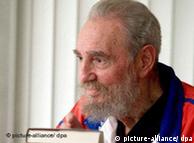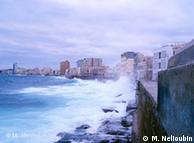Alemania, socio destacado en la apertura económica de Fidel
Desde que se firmó la Ley de Inversiones Extranjeras en Cuba, en 1995, han llegado a la isla millonarias inversiones europeas. Alemania participa desde hace años en este proceso que avanza pese al embargo comercial.
Así como la transición política en Cuba se ha producido de manera gradual, el sistema socialista ha abierto desde hace más de una década sus puertas a cuantiosas inversiones extranjeras, principalmente europeas, a las cuales el embargo comercial decretado por Estados Unidos no les ha impedido sentar sus reales en la isla. Bildunterschrift: Großansicht des Bildes mit der Bildunterschrift: La infraestructura cubana, en la mira de inversionistas alemanes.
Bildunterschrift: Großansicht des Bildes mit der Bildunterschrift: La infraestructura cubana, en la mira de inversionistas alemanes.
El primer antecedente de esta apertura data de 1995, cuando se firmó la Ley de Inversiones Extranjeras en Cuba. Desde entonces, el socio comercial que más destaca en este sentido es España, y el rubro más sobresaliente es el turismo.
Una cadena, 24 hoteles
La cadena Sol Meliá, por mencionar un ejemplo, tiene 24 hoteles en diversos puntos de Cuba. Tan sólo en Varadero son ocho los establecimientos con los que cuenta el consorcio turístico.
La ofensiva inversionista no es nueva: ya en 2001, Sol Meliá anunciaba la conformación de sociedades para desarrollar, con un capital de 40.000 millones de pesetas, nuevos complejos turísticos en zonas no explotadas de Cuba. Es un modelo de coinversión, que involucra también al propio gobierno cubano. Bildunterschrift: Großansicht des Bildes mit der Bildunterschrift: Cuba busca soluciones ecológicas para su industria.
Bildunterschrift: Großansicht des Bildes mit der Bildunterschrift: Cuba busca soluciones ecológicas para su industria.
Alemania, presente
Alemania no ha resultado inmune a la fiebre inversionista que tiene lugar en Cuba desde años antes de que se pensara siquiera en la posibilidad de que Fidel Castro renunciara al poder. Como federación, Alemania guarda un bajo perfil en la llamada "Perla del Caribe".
En parte, ello es reflejo de un enfriamiento en las relaciones diplomáticas pues, de acuerdo con el ministerio alemán de Asuntos Exteriores, "luego de que el gobierno alemán invitara también a miembros de la oposición cubana a la celebración oficial del 3 de octubre de 2003, las instituciones estatales cubanas suspendieron en gran medida el contacto oficial con embajadas y representantes de Alemania. Hasta comienzos de 2005 se volvió a conceder a los embajadores de la Unión Europea un acceso normal. El tema de los derechos humanos continúa presentando problemas en el diálogo político bilateral." Bildunterschrift: Großansicht des Bildes mit der Bildunterschrift: La apertura económica la comenzó el propio Fidel.
Bildunterschrift: Großansicht des Bildes mit der Bildunterschrift: La apertura económica la comenzó el propio Fidel.
Intercambio caluroso
Sin embargo, el intercambio comercial recuerda más bien al exuberante calor isleño: las exportaciones de productos alemanes a Cuba crecieron 150 por ciento en 2005. Alemania es ya el quinto socio comercial de Cuba, con un volumen cercano a los 300 millones de euros anuales.
Estados federados como Baviera y Mecklemburgo-Pomerania Occidental han establecido sus propios contactos con el gobierno cubano. "Cuba tiene un enorme interés en las relaciones comerciales con Mecklemburgo", afirmó el funcionario Jürgen Seild luego de regresar de un viaje a la isla, en 2007. El estado federado alemán pretende exportar productos lácteos al prometedor mercado cubano. Bildunterschrift: Großansicht des Bildes mit der Bildunterschrift: La imagen del Che, parte de la "marca Cuba".
Bildunterschrift: Großansicht des Bildes mit der Bildunterschrift: La imagen del Che, parte de la "marca Cuba".
En cuanto a Baviera, ya se tiene firmados desde el año pasado contratos a mediano y largo plazo por un valor de entre 600 y 700 millones de euros. Inversionistas bávaros tienen en la mira la necesidad de reconstruir la deteriorada infraestructura en la isla, incluidos los centros de salud y las plantas industriales. Bildunterschrift: Großansicht des Bildes mit der Bildunterschrift: Turismo, mina de oro para la isla.
Bildunterschrift: Großansicht des Bildes mit der Bildunterschrift: Turismo, mina de oro para la isla.
Otro sector de importancia es el desarrollo de las tecnologías en beneficio del medio ambiente. Especialistas como el alemán Edgar Göll señalan que, más allá de los clichés, Cuba mantiene una búsqueda "sorprendentemente diversa" de políticas y mecanismos que la ayuden a preservar la sustentabilidad medioambiental. Aquí sin duda también hay un nicho que las empresas alemanas ven con interés especial.
Los cambios en la cúpula gubernamental abren la posibilidad de mayores inversiones extranjeras en Cuba. Pero el cambio principal lo comenzó el propio Fidel, hace mucho tiempo ya.
Rodrigo González Fernández
DIPLOMADO EN RSE DE LA ONU
www.Consultajuridicachile.blogspot.com
www.lobbyingchile.blogspot.com
www.el-observatorio-politico.blogspot.com
Renato Sánchez 3586
teléfono: 5839786
e-mail rogofe47@mi.cl
Santiago-Chile






































